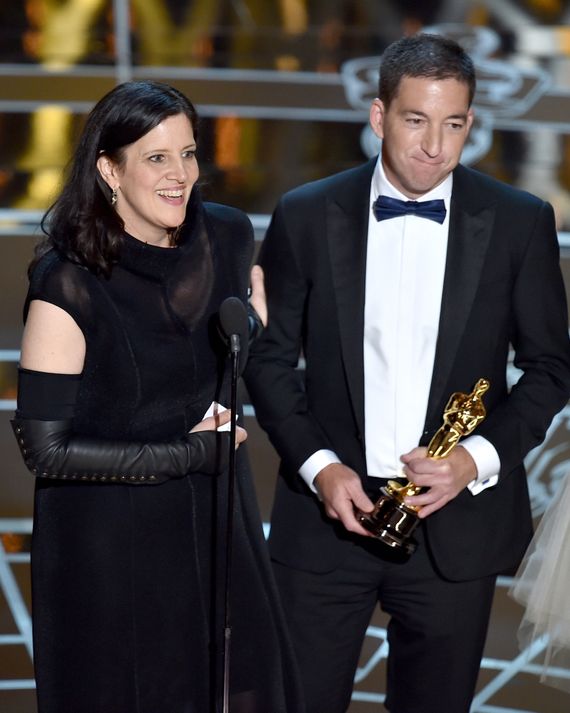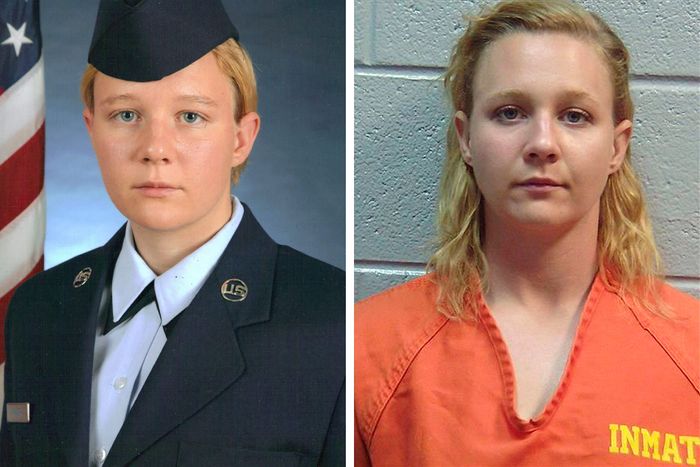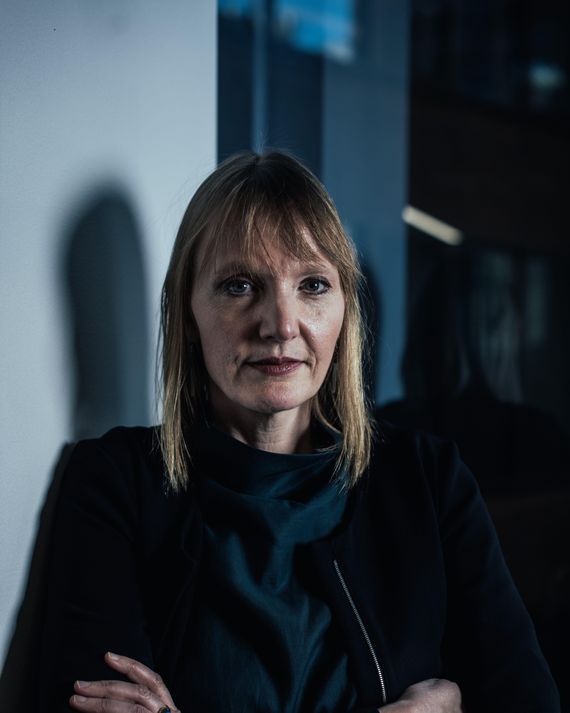
When Laura Poitras co-founded First Look Media with Glenn Greenwald and Jeremy Scahill in 2013, the venture had immediate prestige: Poitras and Greenwald shared a Pulitzer Prize for their work at the Guardian on Edward Snowden’s NSA leaks, and Scahill’s reporting illuminated the excesses of the U.S. global war on terror. Now Scahill is the only co-founder who remains.
Greenwald left in November, accusing the Intercept’s editors of “censorship,” claiming that the outlet had refused to publish a column concerning Hunter Biden’s business dealings, because they were in the tank for Biden. Intercept editor-in-chief Betsy Reed said Greenwald was making himself out to be a “victim, rather than a grown person throwing a tantrum,” she wrote in a scathing public statement.
In January, Poitras announced that she, too, had left First Look — but not by choice. In an open letter, Poitras wrote the company fired her after she gave an interview to the New York Times criticizing the Intercept’s failure to protect NSA whistleblower Reality Winner, who is in prison for leaking to the publication. “I think the reason for the termination is that I’ve been speaking out,” Poitras told Intelligencer, accusing CEO Michael Bloom and Intercept editor-in-chief Betsy Reed of fostering a “retaliatory culture” at First Look.
Now, for the first time, both sides are speaking out at length about what happened. Reed called Poitras’s charge “baseless and frankly ridiculous.” The company says it didn’t fire her but chose not to renew her annual contract because she had been “inactive” for more than two years and instead brought editorial projects to other companies, though it declined to elaborate.
Scahill, who still produces a popular podcast for the Intercept, said he has “great respect for Laura Poitras’s courage and groundbreaking journalistic work.” But he reserved strong words for her recent claims. “It saddens and angers me to see blatantly inaccurate allegations being hurled around yet again about the Intercept and its journalism,” he went on, adding that to his knowledge, “no one at the Intercept was involved with whatever transpired between her and First Look’s management regarding her contract.”
Yoked to eBay billionaire Pierre Omidyar’s fortune, First Look’s properties — including the Intercept and Poitras’s spinoff filmmaking unit, Field of Vision — won awards and produced transformative journalism on police brutality, drone warfare, and the Democratic Party’s factional warfare. It paid Greenwald and Poitras substantial six-figure sums for their respective work, including to Poitras’s film company, which had previously produced the Academy Award–winning 2014 documentary Citizenfour chronicling Snowden’s saga.
Poitras left the Intercept in 2016 to lead Field of Vision. By the time of Reality Winner’s arrest in 2017, the filmmaker had nothing to do with day-to-day operations at the website she’d helped found, such as the reporting or editing of the Winner story. But the case of an exposed whistleblower called First Look’s very purpose into question, she said. “It’s really disappointing for an organization founded on the risks that whistleblowers take,” Poitras said. “That reputation also leads people to trust the organization.”
Winner, then a contractor for the NSA, leaked a classified report on Russian attempts to interfere with American elections to the Intercept. The site’s reporters made errors that helped federal investigators determine who the leaker was. Winner is now serving an over five-year sentence in a federal prison, where she recently contracted COVID-19.
Poitras says that Reed contacted her the day after Winner’s arrest, and that she told the Intercept’s editor-in-chief that if the reports were true, “there have to be some meaningful consequences.” She said she later broke her public silence on Winner’s fate because the Intercept’s failures deserved to be condemned on the record. “That you had errors at such magnitude and such multitude and there’s such a cover-up and a mishandling of the process,” she told Intelligencer. “That Betsy Reed, who oversaw the reporting, had an active role in the investigation … There’s a young woman in jail right now.”
The Intercept conducted two internal investigations into its own reporting process. The first was led by an attorney outside of the Intercept, but people familiar with the investigation claim it was not fully independent: The interviews for the investigation were conducted by the attorney and the Intercept’s head of research, who both played roles in the reporting process of the Winner story. The results were not released publicly, but once it concluded, Reed released a statement in July 2017 which acknowledged certain mistakes during the reporting process. The Intercept did change newsroom policies, though Reed acknowledges there were no firings as a result of the incident. “In any event, I believe we were correct not to scapegoat any individual staffer by firing them for what was a complex and institutional failure involving many people,” she said.
Internally, Greenwald, Scahill, and others in the Intercept newsroom were also dissatisfied with the first investigation, and pushed Reed for a second, independent investigation. First Look tasked David Bralow, the Intercept’s newly hired general counsel, to conduct it. Bralow said that he reported to First Look’s general counsel, not to Reed, and that she did not try to influence the investigation. “I was never told what to write, what to review, what to think,” he said. “And I refrained from discussions about my conclusions with any Intercept staff members until I was done.” Bralow said releasing the results of the investigation “could damage Winner’s defense, place reporters at risk, or implicate other confidential sources.”
About a year later, Reed and Scahill stopped by her production studio in Tribeca with bad news. First Look executives had ordered layoffs, and Reed had identified four positions to cut. Two of the staffers were involved with the security protocols for the archive of Snowden’s leaked files that Poitras controlled with Greenwald.
One of the Intercept’s early crown jewels, the archive became the basis for many of the news site’s earliest major stories. First Look did not own the files, but had an agreement with Poitras and Greenwald to access them. Keeping a trove as sensitive as the Snowden archive required substantial security measures: First Look even spent hundreds of thousands of dollars to build a dedicated secure room, similar to what federal officials use to review classified information. By 2019, the archive had largely been mined of its most interesting material, but it still contained sensitive information, and several First Look staffers kept it secure.
Poitras had not been consulted about the layoffs, since she was no longer affiliated with the Intercept, and she objected once she learned that Reed planned to lay off two staffers working on the Snowden archive. (The two staffers also did work on research for Field of Vision and a minority portion of their salary came out of FOV’s budget.) Poitras waged a passionate campaign against the layoffs in an email to First Look’s board and a separate memo to Bloom, the CEO, as the Daily Beast reported at the time.
She had good reason to fight, she told Intelligencer, because the threatened staffers were vital to the continued operation of the archive’s complex security protocols laid out in a confidential agreement with First Look. “Betsy’s proposed restructuring would eliminate additional key trusted staff and the infrastructure that currently oversees access to the archive,” Poitras emailed Reed, Bloom, Greenwald, Scahill, and CFO Drew Wilson. “The proposed restructuring is both negligent, and would make unauthorized changes to the agreement.”
“Any suggestion that the Intercept violated any contract by making budgetary decisions about its staff is false,” Bralow told Intelligencer.
Wilson, the CFO, promised Poitras in an email that the company would reconsider some of the staff cuts, but days later, the layoffs happened anyway. The decision to close the archive “is not only against the founding of the organization, but against any sort of basic interest in contemporary society,” Poitras told Intelligencer. First Look had “spent enormous resources” to ensure the archive’s total security, she added, and though the system was complicated, “once it was set up, it actually was not that costly. The cost was the staff who were maintaining it. So it absolutely broke my heart that they decided to defund it.”
Nobody wanted to close the archive, Greenwald said. “I never heard anyone at the Intercept talking about wanting to close it. The only reason it was closed was because a dispute arose between Betsy and Laura — after Betsy was required by First Look to lay off four employees — about whether the archive would still be securely maintained if Betsy proceeded to lay off the people she chose to lay off.”
Scahill told a similar story. “It is my understanding that Laura attempted to place conditions on the continued use of the archive that no independent outlet or editor-in-chief could accept and then sought to blame the Intercept for a scenario she herself made inevitable,” he said.
A compromise might have been possible if First Look had agreed to slow down the layoffs, or at least offered a counterproposal to keep the archive appropriately secure. Micah Lee, First Look’s director of information security, said his team could have come up with a plan to secure the archive without the staffers before the layoffs took effect. “But everything moved so fast and people felt so betrayed that I feel like a compromise wasn’t seriously considered,” he said. The archive at First Look closed, but Poitras and Greenwald have full copies of Snowden’s files.
Later in 2019, the relationship between Poitras and First Look deteriorated still further when the company announced it would no longer fund two award-winning publications, The Nib and Topic magazine. She wasn’t alone, either. Topic’s editorial director, Anna Holmes, resigned in protest, later calling her experience personally and professionally demoralizing. Poitras told Intelligencer at the time: “Not only did we lose one of the most talented and visionary innovators in digital media, we also lost the only woman of color in a leadership role at the company.” Poitras and dozens of staffers signed an open letter to executives expressing their “deep concern” that the company’s increasing focus on commercial ventures put its mission “in jeopardy.”
That tension played out between Poitras and First Look’s executives, too.
First Look said it expected Poitras to bring projects to the company’s for-profit entertainment unit, Topic Studios. Poitras, meanwhile, had stepped back from managerial duties at Field of Vision, the non-profit documentary unit she founded, to develop more creative projects. While Wilson, the CFO, said that Poitras had not contributed to First Look “in an active capacity for two years,” a spokesperson later specified they had wanted her to bring projects to Topic.
Poitras pointed out that she had five projects in various stages of development and production with First Look over her last year and a half with the company. She had discussed bringing a project to Topic Studios in 2020, she said, but didn’t feel comfortable working with Bloom, First Look’s CEO.
As the year wound down, Poitras said she had every expectation her contract would renew as usual. The contract stipulated either party could prevent renewal with 30 days’ notice — which First Look gave, on November 30, 2020. On this basis, First Look says it did not truly fire Poitras; it merely ended her contract. Poitras called her termination a “shock.”
“There was this kind of disposability quality to them saying, you’re fired as of today,” she said. “I was absolutely taken aback.”
Now Poitras plans a future apart from First Look. She has several projects in the works, including a feature-length film and a collaboration with Forensic Architecture, an investigative research agency based out of Goldsmiths, University of London. “Really good things,” she promised. “Working with great collaborators.” Good things await Field of Vision, too, she said. “In general in the film industry, there’s an extractive model, trying to get all the rights and extract everything you can from creative people,” she explained. “With Field of Vision, we really tried to say that the collaboration should be additive, and not extractive. That is something that I’m really proud of. So I hope that all remains in place. I feel confident that it’s a great team.”
Correction: The two staffers working on the Snowden archive did not manage its security, but were involved with its security protocols. Poitras had no involvement with day-to-day Intercept operations after she left in 2016.
































